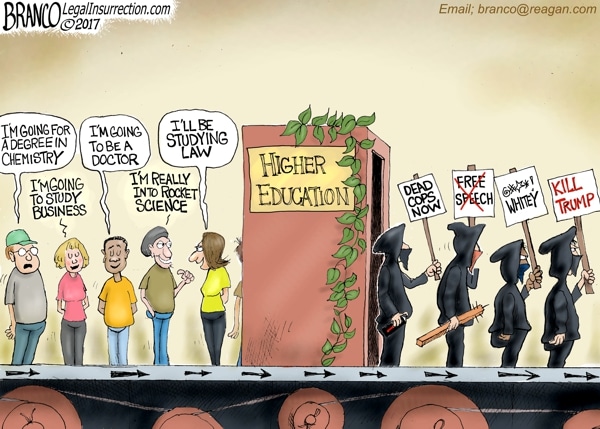
By Bill Wilson
The key takeaway that could terrify the anti-Trump camp more than the former president’s victories in Iowa and New Hampshire have, is that Trump’s strong showing among non-college voters so far could be highly predictive of the outcome of the general election.
Former President Donald Trump swept the New Hampshire primaries this Tuesday, beating out his closest rival Nikki Haley by 11 percentage points with support from a broad conservative electorate. Haley’s support stemmed largely from “undeclared” or independent voters who were encouraged to infiltrate the GOP primaries to halt Trump’s march back into the White House, but this tactic failed.
The eye-popping number from Tuesday’s race was Trump’s massive victory among voters without a college degree, a group that has long been a key Trump coalition. According to exit polls, Trump secured a full 67% of voters without a college degree to Haley’s 31%, increasing his numbers with non-college voters by 25 percentage points compared to 2016.
Historical data spanning each presidential election from 1980 through 2020 shows a strong recurring theme of the non-college vote predicting the winner in presidential elections.
Not only do Americans without a college degree make up close to twice the share of voters as those with one, but non-college voters tend to vote based on economic issues and serve as a barometer for the country’s economic state.
Non-college voters have heavily preferred Republicans in modern elections, but there is one caveat. In every presidential election between 1980 and 2008, a Democrat has won Americans without a high school diploma. For instance, in 1980 Jimmy Carter won Americans who had no high school diploma 51% to 46%, but resoundingly lost voters with a high school diploma but no college degree to Ronald Reagan 51% to 43%.
Republicans on the other hand have won Americans with a high school diploma but no college degree in seven out of the eleven elections spanning 1980 through 2020. In only four modern elections – Clinton’s in 1992 and 1996 and Obama’s in 2008 and 2012 – have voters with a high school diploma but no college degree supported a Democrat for president, and in all four, the Democrat has won the presidency.
In the remaining seven elections, non-college voters have supported the GOP candidate, and in all but one, the GOP candidate has won the election. The only time in modern election history when non-college voters have supported a presidential candidate who did not go on to win the general election was in 2020, when Biden lost non-college voters 48-50% but won the election.
Below is a table indicating the share of the non-college vote – excluding those without a high school degree – each candidate has received in all presidential elections since 1980, and the winner of the general election.

As the data indicates, the non-college vote is highly correlated with the outcome of the general election and may serve as a barometer for the country’s economic state. Non-college voters have favored Republicans more often than Democrats in modern elections, but they cast their vote behind Bill Clinton and Obama twice each time.
Non-college voters supported Bill Clinton’s 1992 election, and then reelected Clinton in 1996, on a largely economic message. In 2008, in the midst of the economic crash brought on by big banks and absurd lending leniency encouraged by big government, non-college voters supported Obama, and they did so again in 2012. In every other election spanning 1980 through 2020, non-college voters supported the Republican candidate. And in every single one of those cases except for the 2020 election, that Republican candidate won the presidency.
In the last two presidential election cycles, non-college voters have shifted significantly toward the GOP, concentrating their votes behind Trump in 2016 and 2020, after flipping to Democrats for Obama in 2008 and 2012.
In 2008 Obama won the non-college vote 52% to 46% and went on to win their vote again in 2012 51% to 47%. However, Clinton was not so lucky. In 2016 Clinton lost non-college voters 44%-52%, and subsequently went on to lose the general election. In 2020, Biden did slightly better than Clinton with non-college voters, but still lost the group to Trump by a margin of 48%-50%.
Non-college voters play a pivotal role in elections because of their sheer numbers, and their concentration in battleground states, including Pennsylvania, Ohio, Michigan and Wisconsin.
According to exit surveys, Americans without a college degree made up 59% of the total electorate in 2020 and played a key role in GOP margins in swing states.
The non-college vote is highly correlated to the eventual winner of presidential elections, creating an early indicator for the outcome of elections. In addition, non-college voters tend to rally behind candidates with a strong focus on economic issues, especially in times of economic crisis.
Virtually every measure of voter enthusiasm this year shows that voters strongly disapprove of the way Biden is handling the economy, are confused and bewildered by his “Bidenomics” message and are hungry for political change and an upset to the current system. In addition, there is a clear desire from the voters to forge a connection to candidates for office. With Trump steadily on the stump and among the voters while Biden remains aloof and hidden coupled with an unstable and spotty economic picture, the race is becoming tougher and tougher for the Democrats.
And while these facts are becoming more obvious, it is becoming more questionable if a Democrat alternative to Biden could solve the problem. Can a Michelle Obama appeal to non-college voters? Does Gavin Newsome and his California track record offer a pathway to reclaim America’s working class? While the corporate media pretends all the tough choices are facing the GOP, the facts indicate that it is the Democrats who have much more difficult challenges.
Bill Wilson is the former president of Americans for Limited Government.






